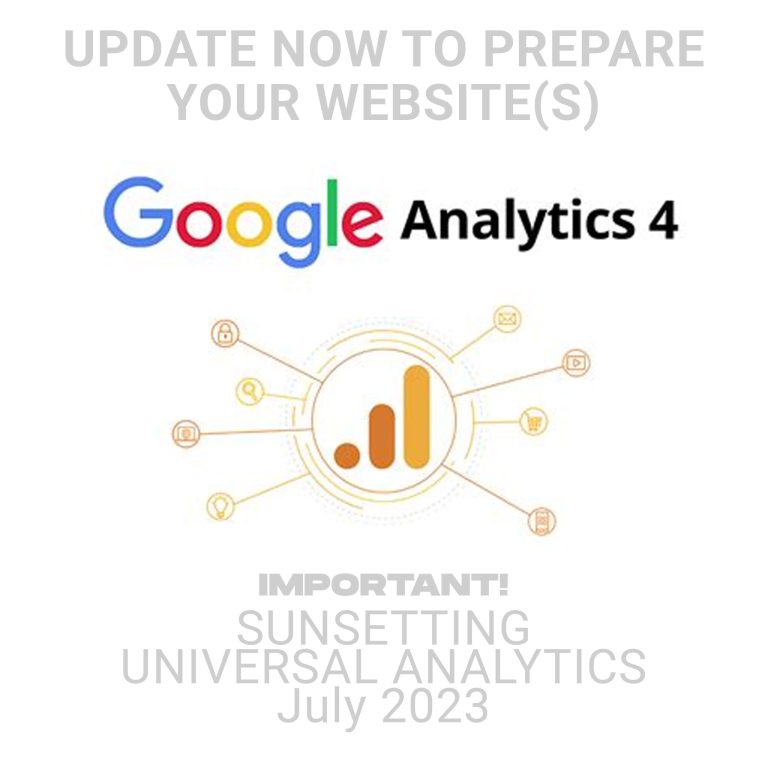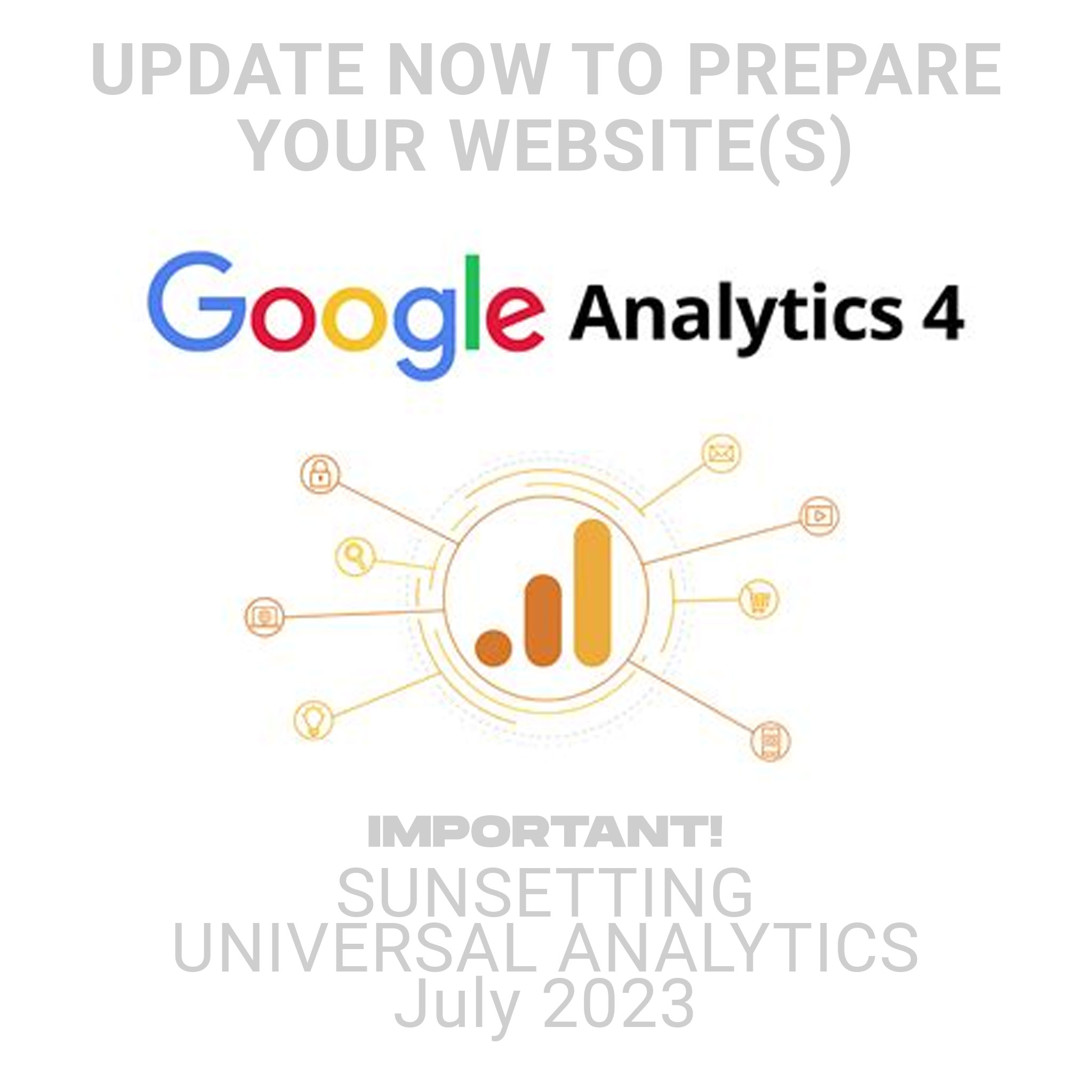Google launched its next generation of Google analytics back in late 2020. It is called Google Analytics 4 or GA4, and is quoted as "the future of Google analytics".
Is the new Google Analytics 4 different from Universal Analytics? Yes. Do you need to upgrade? Also Yes.
What we need to know about Google Analytics 4 property
• After July 1st, 2023 Universal Analytics will only be available for an additional 6 months.
Web owners need to take action now to properly setup and configure their new GA4 accounts, data streams and conversions.
• Google Analytics 4 is different from Universal Analytics for the way it tracks users online. A switch from cookie-based tracking to event based tracking will allow online marketers to better understand and respond with their audiences.
• The user interface in GA4 is quite different from Universal Analytics. Fortunately Google has provided a free skills workshop for us to better understand how to configure and use the new platform .
Resources to get started with GA4
• Add a Google Analytics 4 property (to a site using Universal Analytics)
• Setup GA4 Analytics for CMS-Hosted Website
• Setup Analytics for a website or application
What is Google Universal Analytics?
Google's Universal Analytics (UA) tracking is a comprehensive website visitor and engagement tracking tool which monitors brands visitor metrics such as page views, traffic sources, e-commerce tracking, and website conversion best analytics tool. Google's well known and staple "Universal Analytics" has been the go to website tracking property since 2012.
Initially UA was geared for desktop but as the mobile device market expanded and improved its speed and technology, it began dominating online web browsing. Google modified it's systems as best it could to meet the many data-points that help marketers and business leaders to develop great online content. Using GA for over a decade I can comfortably say they did a really good job rolling out updates and enhanced e-commerce tracking which really helped the optimization process for online stores.
It has been a reliable tool that has allowed us as marketers to uncover information about our websites performance through the loads of data it collects. It has allowed businesses to deep dive into users engagement and interaction with their brands better understanding their customers and thus providing improved products and services.
Universal Analytics performed as best it could but was never truly designed for mobile tracking thus an overhaul of the platform and how it captures data was needed.
What is Google Analytics 4?
Google Analytics 4 is the successor of Universal Analytics. It packs a better look at your traffic data and leverages artificial intelligence to help fill in gaps that Universal Analytics could not fill.
Why do we as marketers need Google Analytics 4?
“Universal Analytics was built for a generation of online measurement that was anchored in the desktop web, independent sessions and more easily observable data from cookies,” Russell Ketchum, director, product management at Google, said in a announcement. “This measurement methodology is quickly becoming obsolete.”
Despite Google's incredible developer team the ever-changing mobile application and digital world "Universal Analytics" is to be sunset and Google Analytics 4 will take over.
At first glance the layout has been updated and looks nice and clean. Once you start digging into how the data is presented you can take a big sigh of relief, GA4 is much easier for marketers to hone in on the data that drives online growth. Events natively tracking today's most common metrics, beyond page views quickly access download, clicks, scrolls, with data for video starts, progress and completions.
Google Analytics 4, a "new kind of property"
Google says that its GA4 tracking is a new kind of property, it has improved reporting and looks a whole lot different from what we see as marketers using "universal Analytics". Google Analytics 4 is not only packed with new ways to look at data but also how it collects data. GA4 is able to track multiple properties allowing a brand to track not only it's website but mobile app, portal or quote engine and report it under one property.
This all sounds great but do I really need to switch to Google Analytics 4?
Yes, you do. In March 2022, Google announced that it will begin sunsetting the old version of Google Analytics (Universal Analytics) on July 1, 2023. It's successor GA4 will take over and provide webmasters with new privacy features, powerful reporting, predictive intelligence and a much deeper integration with other Google Services including Google Ads.
What does it take to upgrade universal analytics to GA4?
Unlike most analytic updates GA4 is a completely new online tracking platform, and because it tracks data differently new tracking markup will need to be added to your online channels.
Luckily Google has made upgrading to GA4 fairly easy to get your website and digital properties updated.
When should I upgrade to Google Analytics 4
For now Google recommends for websites currently using Universal Analytics, to add the GA4 tracking code to existing environments. For brand new websites, simply install with GA4.
Google Analytics will be phased out in 2023, so the time is now for businesses and online brands to make the necessary updates and start utilizing GA4's new platform. It's best to add GA4 while still using Universal Analytics so that as GA4 gets up and running you will have accurate historical tracking for your online channels.
What are the differences in Google Analytics 4 Tracking Property?
Arguably the biggest difference is how GA4 tracks online data. As we continue our path toward a cookie-less online environment GA4 solves many problems and includes new opportunities to better, analyze, interpret and develop more engagement across online channels.
Another difference in GA4 is the way its data modeling incorporates the power of artificial intelligence to help marketers fill in gaps that Universal Analytics" often left.
This is an issue as more web browsers block cookies, the same way Universal Analytics uses to track data. Cookie-consent rules, blocked JavaScript and an heightened focus on data privacy has made it difficult for Universal Analytics to track online engagement accurately.
Fortunately the new Google Analytics 4 tracking property has anew way of gathering more data about each web visit. With Universal Analytics web traffic and user behavior relied heavily on "hits", GA4 takes this a step further and helps better understand the customer journey and interactions with a brand online.
Google will continue to roll out enhancements for GA4 and this will continue to help marketers gain the most performance out of their digital content.
Updated terminology in Google Analytics 4
Event Tracking in Google Analytics 4:
Event tracking is how GA4 registers actions such as page views, user actions, button clicks and similar behaviors. Unlike Universal Analytics event tracking is now native and most event tracking will not require special markup to define parameters and capture your data.
Parameters in Google Analytics 4:
Parameters is the new "dimension" sections of Universal Analytics within GA4. Parameters are additional bits of information captured by GA4 that provide more context around events. Parameters can be used to describe the value of a purchase, or to provide additional information such as where, how and why an event was logged. Parameters can include page titles, article IDs.. -
User Property in Google Analytics 4:
User property feature attribute or demographic information about your online visitors.
User ID in Google Analytics 4:
User ID is the method GA4 allows for multi channel tracking including Apps. With enhanced measurement and a heightened focus on "events" GA4 will allow webmasters to better understand the performance of online channels.
With GA4 Enhanced Measurement, you can now automatically track one or more of the following events.
These events are enabled when you set up a new GA4 data stream and no longer require additional tags.
• Webpage scrolls for at least 90% of the page
• Outbound clicks from your website
• Search queries entered in websites search function
• Engagement of visitors watching embedded YouTube videos
• File download data
It's important for businesses to begin the migration and gathering data using Google Analytics 4 property. With the shift to cookie-less activity and begin event tracking analytics. GA4 adds a whole lot of information geared to help marketers understand the data more easily and develop better online experiences for their users.
The time is now to update and setup for success in a cookie-less online world. It is important to start the process of getting GA4 on your website asap especially with the shift of cookie-less activity and to start tracking event-based analytics. With increased touchpoints online combined with cross-device activity, the addition of analytics to match this will be a great marketing resource to come.
For additional information about GA4 visit:
https://support.google.com/analytics/answer/9964640?hl=en


